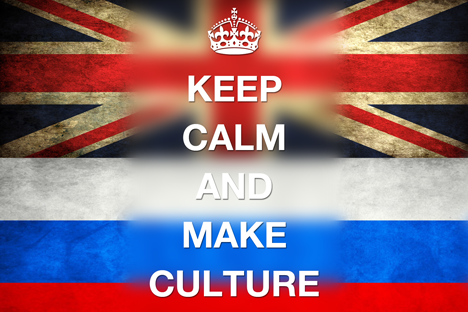
Click to enlarge the image. Drawing by Niyaz Karim
This year has not been particularly successful for our bilateral relations, to put it mildly. Indeed, it’s a challenge to profess optimism in the face of official ties almost frozen at all levels. The way out of the doom and gloom mood seems to be to have a look at a broader picture. After all, the Euro-Atlantic and global context explains the origins of the present state of affairs between Russia and the West. What comes to mind?
First, it’s difficult to extract this conflict from a global environment defined by economic and financial crisis. The latter reflects another systemic crisis of western society. The previous such crisis required two world wars and the geopolitical imperatives of the Cold War to accomplish societal change. This time, hopefully, nobody is talking war but the lunatic nationalist fringe in Ukraine.
Second, it looks like an endgame of the deeper and complex processes on both sides of the Cold War divide. The Soviet Union reached its impasse first. Now is the turn of the West. This analysis is supported by the latest research by Francis Fukuyama and Martin Wolf.
Russia’s relationship with the West is held hostage to crises for which Russia bears no blame. In such watershed times, some leaders look for the usual suspects to round up. This accounts for the utter artificiality of the Ukraine crisis. It was also a display of unilateral action, contrary to the multilateralism espoused by the EU. The latter’s foray into geopolitics is a sign of something amiss in the European project.
Naturally our bilateral ties flourish where life remains, ie, in business, so far as sanctions permit, and most of all in culture. We have been through similar periods, when these two pillars helped support the entire edifice of our bilateral relationship. Sometimes it helps to change the topic.
As to business, there is no need to explain here, in the land of Adam Smith and John Maynard Keynes, that sanctions, while a poor substitute for real war, run counter to the basic principles of market economy and undermine the confidence financial markets need. Our trade goes on, although the figures are smaller: $5.5bn for the first nine months of the year, $24.6bn for the previous year.
Britain and Russia are particularly lucky to possess cultures of universal value. Everything in humanity ultimately boils down to culture. It was not by chance that this year was declared by our governments the UK-Russia Year of Culture. Though official presence and scope were scaled back on the part of the British Government, we have succeeded in many ways, including exchanges between museums. The embassy has been presenting Ushakov medals to British veterans of Arctic convoys (1,500 have already received it). Their unique contribution to the war effort was also recognised in Britain.
Hard times are conducive to reflection and philosophy. Shakespeare, a genius and a unique product of the European Renaissance, will always justify Britain’s being in the world. At least, this is the view of our philosopher Nicolai Berdyaev on Dostoevsky and Russia. Our two nations have always been challenged by the universalism of our literatures.
Geoff Dyer’s Zona, inspired by Tarkovsky’s film Stalker, examines silence, the last word and finitude. As an observer of America’s political scene for the Financial Times, he can judge for himself that those categories also apply to the body politic. Russia keeps channels of communication open. Mr Putin and Mr Cameron still meet to debate our differences. Whatever the appearance, we may be much better off than meets the eye.
I have no doubt that we shall overcome.
Alexander Yakovenko is Russian Ambassador to the United Kingdom. He was previously Deputy Minister of Foreign Affairs.
All rights reserved by Rossiyskaya Gazeta.
Subscribe
to our newsletter!
Get the week's best stories straight to your inbox